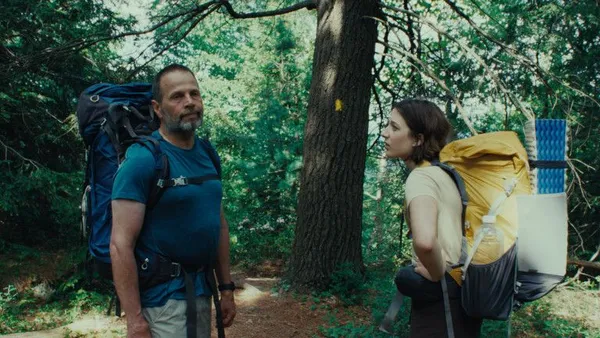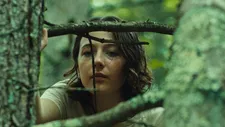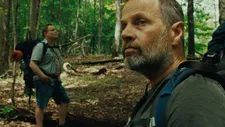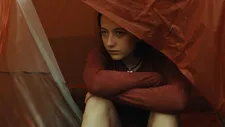 |
| Good One |
Director India Donaldson's feature début, Good One, is an incisive study of human nature through the interpersonal dynamics of a trio of characters. The story revolves around 17-year-old Sam (Lily Collias), her father Chris (James Le Gros) and his best friend Matt (Danny McCarthy), who set off on a backpacking trip to the Catskill Mountains, in Upstate New York.
Compared to Donaldson's short films, which have all been women centred-stories, Good One represents a notable gender shift. Her first short film, Medusa (2018) saw a woman falling in love with a statue, while her third short, If Found (2021), followed a young girl's experience of love at first sight - with a dog she steals. Despite her feelings, all does not go well in this romantic tale. Perched in-between, Hannahs (2019) follows a woman who cons herself into a surprising intimate encounter with another woman.
 |
| Good One |
In conversation with Eye For Film, Donaldson discussed turning her creative frustrations into motivation, her love of short stories, how the quietly thoughtful Sam emphasises the importance of listening, and why she chose to avoid a "super flashy or violent" narrative disruption.
Paul Risker; How did the expectations of your feature début compare to the realities of the experience?
India Donaldson: There's a huge divide between expectations and reality. Part of it was a self-protective attitude I went into making the film with. I had been trying to make a different film for many years and was familiar with those feelings of disappointment. I said to all the people that came together to produce this film, "The goal is to have a film at the end of it."
You have to try for everything, and you have to finish the cut to submit to Sundance. Every step of the way, every positive moment was sincerely a huge surprise because we made something that felt intimate and personal to us. We did it methodically and creatively in our way, and honestly, relief is the feeling that describes my experience. After all the hard work on the part of everyone involved in the making of the movie, that people are going to see it is really a relief.
PR: Filmmakers have told me making films is like an addiction. So, despite this feeling of relief, are you ready to throw yourself into another feature?
ID: Absolutely. I have a three-year-old and I liken making a film to parenting in many ways. When my son was out of the baby phase, I started to miss it even though it was hard, and I was constantly reflecting on how hard it was during it.
When we finished the shoot, I told everybody this was the best two weeks of my life. It was so much fun and there were plenty of challenges that came after that with finishing the film. But just for the process and the people, it was the best experience, and I hope to replicate that again because I felt so lucky to experience it.
PR: How would you describe your relationship with cinema and the way your films relate to your personal cinematic tastes?
ID: My tastes are much broader than the specific tone that I am drawn to in my own writing and filmmaking. When I think back, starting in childhood and through my teen years and twenties, the films that really drew me in were not just enjoyable, they made me feel inspired creatively, and it was often performance and relationship driven.
I have this memory - I was really into knitting when I was a teenager and in college I can remember knitting this boring sweater. It was in the early Netflix phase where you would get the DVDs in the mail, and I'd choose films for length because I had to get this sweater finished [laughs]. I remember on a break from college watching Scenes From A Marriage for the first time and being completely mesmerised. It was just the subtlety of the performances and the turns in that story. Then how specific but also universal it felt and the tension between that specificity and being universal enough that it could touch me in 2004 in Los Angeles. So yes, that's the through line. I think my relationship with cinema is inextricably linked to the way that I watched films, or I was drawn in by actors.
 |
| Good One |
PR: What was the seed of the idea for Good One and being drawn to actors, how much did that influence the type of film you chose to make?
ID: The genesis of the idea was a convergence of many things, but I wrote and designed the film to be makable on a limited budget. I think this came out of the frustration of not being able to make a film I'd been trying to make for many years. It wasn't a hugely expensive film, but it was one step above what I was able to get financiers to trust me with. So, during the pandemic, when it felt so much harder to make an independent film and to make a first one, I just felt this incredible sense of urgency. I just had to make something that I could do with my friends, keep the crew small, and keep the environment simple and contained.
Of course, it wasn't always simple, but that was the intention. I wanted to still be ambitious within the means and that was possible with story and character and the types of relationships between these three characters. I could go as deep into that as I wanted. I didn't need money to let me do that, so it felt like I just had to write a script that I hoped actors would respond to. The challenge then was to get the right people.
With Sam, the main character, I had this idea she would be someone who says the least but has the most to say. How I would use the camera and edit the film would prioritise and elevate her ability and strength as a listener. This would be a powerful way for her to participate in the [relationship] dynamics.
Casting Lily, she's someone I could watch, and the movie does watch her do a lot of mundane things. I am drawn in by her face, her physicality, her patience and her presence. It's a special kind of actor that can do that and as soon as I saw her audition I thought, 'Yes, she's performing a simple scene, but I can see three different layers all coming together in this seemingly effortless performance.'
PR: Good One doesn't seek to appropriate nature as its characters' world. Instead, it communicates a deeper respect for nature through music, which creates a near perfect harmony between humankind and nature.
ID; Celia Hollander and I talked a lot about the conversation happening between the sounds of the natural world and her music. She layers in a lot of different types of sounds, some more organic, and some electronic. She composed a lot of the music while living in the area where we shot the film and she herself is an avid hiker and backpacker. I had collaborated with her several times before, so we had already developed a collaborative shorthand, but in particular with this film, she really locked into that relationship.
When I thought about the film's sound design, it was not only the natural sounds but the way the dialogue plays off-screen texturally and sometimes competes with those natural sounds. I was thinking about all of this being in conversation with each other because that's the experience of being outdoors. When you're in the woods, there are these sounds that suddenly become very loud and present in your perception - the wind through the trees, your footsteps or even your heart beating or your breath. Normally you’re not paying attention to these sounds, and I was playing with how it feels physically and emotionally to take a trip like this.
PR: Good One demands that the audience be patient and 'see' and 'hear' the characters. The narrative doesn't talk down to the audience. Instead, it requires the audience to enter the characters' space and to emotionally and intellectually engage.
 |
| Good One |
ID: I think about what you're describing a lot because the films that I find most satisfying and inspiring as an audience member require that attention from me. There's something generous about that - you're trusting your audience to sit with you and interpret these dynamics and bring their own experience to them. I remember that was my experience when I discovered Joanna Hogg's films - how much attention they demanded and how rewarded I felt by giving the film my attention.
People talk a lot about films that are worthy of a theatre experience and, personally, the films I feel most deserve and require that immersive, put your phone away and don't do anything else, are films that are quieter and demand your attention. These are films that require you to be a more active participant in the process. I love to sit back and watch a fun movie too, and that can be incredibly satisfying.
PR: What struck me about Good One was how subtle the transformation in the relationship of the three characters was, to the point that it's left for the audience to acknowledge.
ID: I am a great lover of short stories and sometimes my favourite adaptations of literature are shorts because it interests me when you take something contained and go deep to explore all its different angles. With Good One, I had this idea that if you really give the audience a chance to get to know these characters, and hopefully have affection for and care about all three of them as human beings, and the film slowly reveals layers of their history with each other, then any disruption or shift to the dynamic will feel bigger without being super flashy or violent. It could be something small, but it would feel huge and would cast everything that came before it in a new light or force you to reinterpret everything you had watched for the last hour.
The campfire scene that happens an hour into the movie is actually in the last ten pages of the script. It felt like it was the end, but I was interested in stretching the rubber band of tension as far as it could go, until it had to snap. Something had to happen to break it.
PR: Winston Churchill's words, "The end of the beginning" are a fitting way to describe Good One because Sam's relationships are going to change, and she knows she's heading into an untidy future.
ID: When I get to the end of a story, to know it's not entirely over, and it's just the start of something else is when I feel most satisfied. I appreciate that thought, thank you.
Good One screened in the US Dramatic Competition at the 2024 Sundance Film Festival and is released theatrically in the US on Friday August 9th by Metrograph Pictures.





















